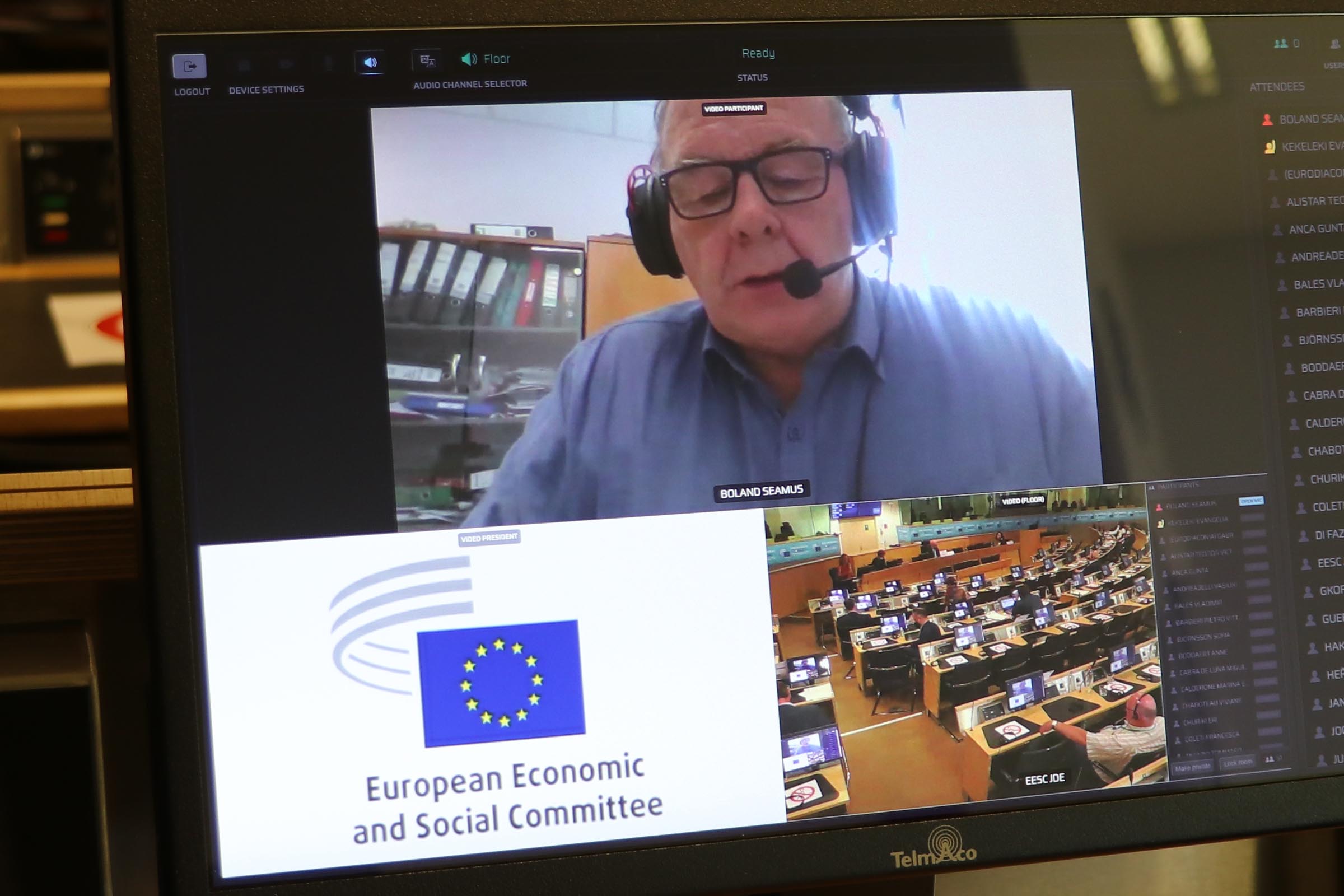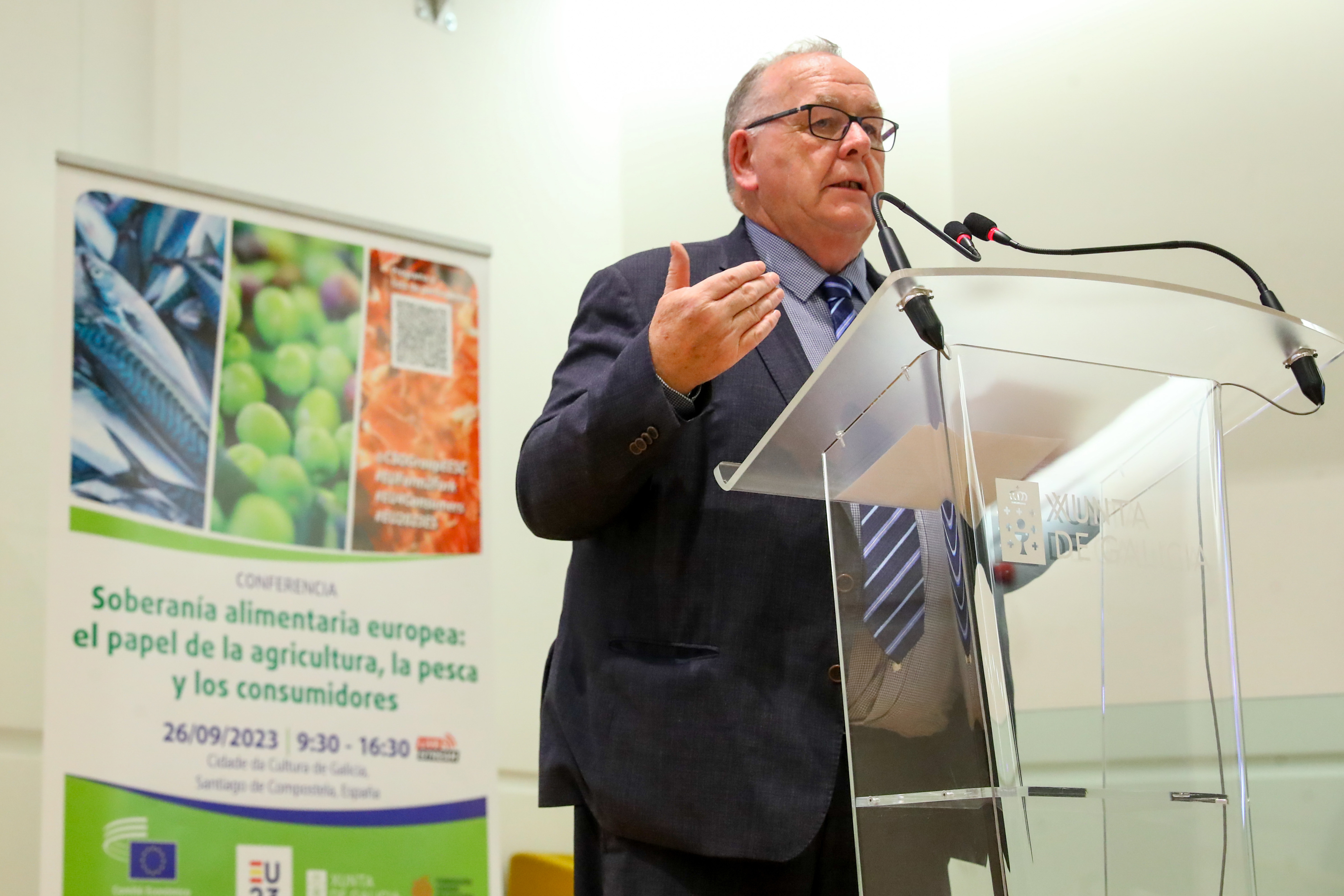Séamus Boland, president of the civil society organisations group of the European economic and social committee (EESC): Civil society organizations must be at the heart of Europe, where policies are shaped
Séamus Boland, President of the Civil Society Organizations Group of the European Economic and Social Committee (EESC), is a prominent advocate for rural development, social inclusion, and sustainable policies within the European Union. As a voice for civil society and rural communities, Boland plays a vital role in aligning European policies with the needs of local populations. His extensive experience in promoting participatory decision-making and addressing challenges such as depopulation, climate change, and uneven development makes him a key figure in understanding the complexities of European policies, particularly in the increasingly pressing context of rural areas.
For Udruga.hr magazine and Poslovni savjetnik web site, Boland shared his vision for the future of Europe, as well as the challenges he faces in his work to ensure the EESC contributes to building a fairer and more sustainable European society.
Could you briefly outline your professional journey and how you came to your position in the EESC?
I left school at thirteen to work on the faily farm of 5 hectares. My first foray into civil society organizations came when I was 15years old, when I joined Macra Na Feirme or Young farmers.
In my mid twenties I studied and received a teaching degree in speech and drama. I then taught the subject for a number of years, with particular focus on young people who fell through the education system. This led to working with a number of voluntary organizations dealing with youth and disability. I then helped reform Midlands Youth Servces in Ireland, becoming the manager for seven years. Part of this work led to working with a range of disability organizations involved in re-training, and rehabilitation.
I then joined Irish Rural Link, a national organization dealing with the issue of rural sustainability and rural poverty. IRL is part of an umbrella group of national organizations, who would later form one of the pillars of social partnership in Ireland. One of the powers of this umbrella was being able to nominate a representative to the EESC for government approval.
Luckily they did and here I am.

What are your main responsibilities as a member of the EESC?
As a member, the EESC representative will participate on the writing of opinion, connected to proposed EU legislation. Because the committee is comprised of Employers, Trade unions and Civil society organizations, and because of its placement in the . Rome treaty, it plays a vital role in connecting civil society with the political institutions.
In 2019 I was elected to what is known as President of the third group Civil Society Organization. In effect this meant that I would go on o be the first man from Ireland to be elected for this position. On December 04, I was elected as President designate of the the EESC starting in 2025, when I take over from Oliver Ropke.
How do you evaluate the role of civil society in shaping sustainable policies?
Civil Society is often the first responder to various emergencies. Recent examples are covid-19 and climate disasters across Europe. Civil society also plays a huge role in delivering aid and assistance to war torn countries like Ukraine and other. In the 'Future of Europe" series of seminars organized by the EU Commission the role of Civil Society Organizations as a whole was considered as integral to connecting citizens to the institutions. And if managed correctly narrowing the democratic deficit perceived widely in the EU.
What are the most pressing issues and challenges for civil society organizations in the EU today? What is their main focus?
Civil society organizations are mainly excluded from social partnership. This exclusion means that valuable information in the hands of these organizations is not available to European policy-makers and those of member governments.
This is a huge disadvantage and failure to correct it means that the EU are becoming more distant from the needs of communities and citizens. Hence the huge anger ampong voters. I propose that CSO's need to be at the center of Europe, where policy is designed.
Secondly Civil society Organizations are at at the coal face when it comes to working with citizens who are affected by chronic poverty, no access to education, health and vital public services.They are seeing rising cases of serious poverty, which is becoming a pandemic in certain areas. Therefore the eradication of poverty urgent.
Clearly climate change and the need to urgently deal with the consequences is essential.
I have called on a comprehensive social and financial plan that has the same urgency as the famous US Marshall plan of world war 2. Without a proper just transition pland Europe will not achieve the many climate targets it has signed up to .
Europe has also major issues to manage, in terms of Defense and security, not to mention the rule of law. Since the advent of two major wars, it is almost certain that millions of EU citizens are looking for peace. Equally, doing doing nothing and allowing the greater powers to dictate, is indeed extremely dangerous.
The eratication of poverty in Europe and the world has always been a focus of civil society organizations and indeed all concerned with the EU. Allof these organizations are connected to programmes in this area and have a huge part to play in continuing this work. 
European society is aging. What plans exist to better achieve intergenerational solidarity?
The EESC has just produced an opinion, which ask us all to consider the financial and social cost of an increasingly aging population. Unfortunately many of the plans that exist will not completely solve the issue of housing, cost of health and pensions along with the rising cost of living. If we ignore this , then the next decade will see major problems for Europe.
So in short the issues around this are:
Cost of Pensions, Health and Caring and the implications this will have in all aspects of economic planning. There are also fears that the working age population is declining, which will weaken the economy, thus creating huge deficits in terms of GDP etc. In effect failure to take seriously the subject of intergenerational solidarity should be seen as a major risk in terms of overall EU solidarity.
What do you consider to be the top priorities for rural development in the European Union?
1.Solving the huge cost of transition away from fossil fuels.
2.Resolving the Food security.
3.Making rural Europe a sustainable place to live in.
There is still a huge gap between rural and urban, in terms of cost of living, access to public services, sustainable transport, employment.
The potential membership of the EU from Ukraine, has huge implications rural Europe in terms of the CAP budget.
How do climate change impacts affect rural communities, and what measures do you propose to mitigate them?
As said earlier, actions to achieve climate change require significant changes in farming practice and energy provision, will require radical investment similar to that of the Marshall Plan.
In rural communities, the potential to create solar based energy is enormous, using farm shed and land that is useful for no other purpose. Similarly for wind power. Moist rural housing could be made 'Passive Energy houses', thus reducing the dependency on fossil fuel by almost 80%.
Changed working patterns, such as working from home or rural towns and villages could significantly contribute positively in arresting the decline of these villages , while at the same time improving the quality of life.
Depopulation is a significant challenge for rural areas. What concrete steps should the EU take to retain populations in these regions?
Work can now be managed from the home or in special work hubs constructed in rural villages. The cost of commuting is a heavy burden on many people and the companies the work for. As said the ability to work from home should be reinforced.
Because of the greater input from IT technology, the EU will need to find incentives to encourage the establishment of work or business hubs in the wider rural settlements.
Also the potential for increased biodiversity programes will require a mix of skill levels ranging from academic to precision based abilities, which will increase the opportunities to live and work in rural areas.

How can the voice of rural communities be better integrated into EU-level decision-making processes?
Rural voices are not catered for by mechanisms such as social dialogue. This has to change. It is surely possible that the EU Commission could identify processes of dialogue with the respective organizations. Otherwise the dialogue of thousands of tractors clogging up the streets of Brussels and other capitals remains. Equally voices from rural areas advocating the eradication of poverty or demanding proper rights for minority grops, including race, gender, disability and so on , need to be heard. Special measures will be needed in terms of funding these groups, who because they often represent the poor do not have the necessary financial resources.
Some EU critics claim that excessive bureaucracy and regulation are harming the economy and farmers as well. The EU Council of Ministers has announced plans to eliminate controls and penalties for farms up to 10 hectares this year. Is this a good measure to encourage small farmers to continue their work?
Unfortunately bureaucracy continues to stalk the CAP. The 10 Hectare rule is a start, but falls far short of what is required. It is often the elaborate design of these pages that confuses. One of the huge disadvantages caused by high levels of regulation, is the cost to farmers and others, because of the need for high level advice needed to manage the whole process. Most farmers and others will not have the necessary know-how to manage what is often a very complicated bureaucratic process. To overcome this lack of support, the least that these programmes could do is to ensure that adequate financial support is in built in the various financial package. 
What are the key barriers to achieving social inclusion in rural areas?
Social exclusion is often more invisible in rural areas. Various minorities or people affected by disability, tend to move towards the cities looking for help. Often various agencies are not equipped to provide advice to women affected by domestic violence or to people experiencing huge poverty. Also Rural poverty is also invisible and requires targeted approaches that are designed by rural experts. Underlining all social exclusion is the reality of poverty. By its nature it deprives people of the necessary resources to overcome many of the barriers that create exclusion.
Could you share examples of successful projects that have had a positive impact on rural communities?
Locally designed rural transport programmes, such as www.locallink.ie in Ireland have made a huge difference. www.mealsonwheels.ie offer a range of befriending services, which identify people in need of many other services and again make a huge difference.
How do you assess current European policies related to rural development and where do you see room for improvement?
Rural development is covered under the CAP funding programmes. Unfortunately the Leader budget designed to reach many rural populations is still only a very small percentage of the total budget. In that context, some serious question marks apply.

How can the EU better balance the needs of urban and rural areas?
Urban and rural areas should be managed on a regional basis. With well designed regional planning, urban ad rural areas can be balanced in terms of investment into business and social provision.
What would you highlight as the biggest challenges in implementing the Common Agricultural Policy (CAP) in the context of sustainability?
Sustainability is extremely difficult to achieve. On the one hand it requires farmers changing current methods of production. Yet these changes will reduce food production and farm income. Again the heavy bureaucracy of CAP is proving extremely difficult and is failing to achieve real targets
What is your vision for the future of rural Europe and how do you see the role of the EESC in achieving that vision?
A vision of rural Europe hinges on its ability to transform methods of food production, in a way that is not damaging to the environment and the income of farmers.
What is your message to Croatia regarding the growing decline of its rural areas and the drop in agricultural production year after year?
Croatia is of course a beautiful country, very rural and rich in terms of diversity. If it can hold on to strong rural leadership, which is focused on preserving all that is good in terms of nature and somehow balance food production, that can be sustainable long into the future then it will lead all markets.
Interviewed by Business Media Group journalist Goran Jungvirth, for Udruga.hr magazine and Poslovni savjetnik web site
Photos: EESC
(ps/sm)

















